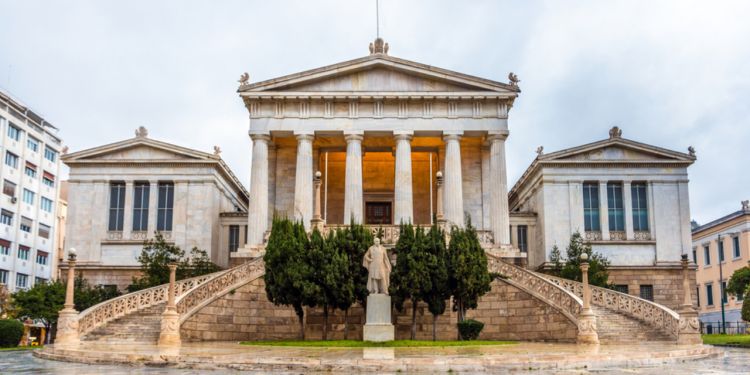
If you're thinking of studying in Greece, you'll certainly be in good company — after all, how many people can claim they studied on the same grounds where Socrates, Plato and Aristotle used to teach? Greece has a celebrated past as the home of philosophers, thinkers, and historians, especially considering its universities being ranked as among the best in the Southeast European region in the last few years.
Do you need a visa to study in Greece?
EU citizens can study freely in Greece. If you're from a non-EU country and you've been accepted to a semester abroad or a full degree program at a Greek university, you will need to acquire a student visa from the Greek embassy or consulate in your country. Apart from the standard documents (passport, photographs, etc.), you will need to submit some proof that you can support yourself financially, medical and police clearance, academic transcripts, language certificates and documents from the Greek University.
If you're looking for a visa that will allow you to work in Greece, this is possible under the right circumstances. If you intend to spend more than a semester in Greece, which would usually be the case if you intend to take an undergraduate or postgraduate program, you can apply for a student residence permit — ‘Adeia diamonis yia Spoudes' (Άδεια διαμονής για σπουδές) — that allows you to do some part-time work while you study, to support yourself financially. When you've finished your studies, however, you would need to apply for a new residence permit in Greece. This can be either a ‘Student's right to stay for work', or a ‘residence permit for the purpose of work'. Both permits give full access to the labor market. This is important because merely renewing your current student permit would not work, as your studies permit only allows part-time work (around 30 hours in Greece).
What documents do you need to study in Greece?
Students that hold a valid EU/EEA passport do not require a visa to enter Greece. As for non-EU students wanting to study in Greece, they will first require a National D-Type visa for entry — this permits a stay of a year. After obtaining the visa and entering Greece, it is recommended that you immediately apply for a residence permit if you are likely to remain in the country for three months (the same applies to EU students wanting to stay more than 3 months)
The following documents are required for the residence permit for studies:
- A copy of your National D-Type Visa
- A valid travel passport or travel document, along with photocopies
- Two passport photos (35x45mm), along with a digital copy
- Letter from your university/institution confirming your admission and duration of your studies
- International health insurance that will cover the duration of your studies
- Proof of funds showing that you can financially support yourself when living and studying in Greece —- a minimum of 400 euros a month
- Proof of receipt for a fee of residence permit, the fee is 180 euros (this can sometimes be paid in the office)
- Proof of payment of the residence permit processing fee – 16 euros
Greek educational system, institutions and fees
The Greek educational system is divided into a primary, a secondary and a tertiary level, with an additional post-secondary level for vocational training (IEK). There are over 20 universities across Greece, with the National and Kapodistrian University of Athens, the Technical University of Athens and the Aristotle University of Thessaloniki being the most prestigious. Apart from these universities, there are also 15 Technological Educational Institutes (TEIs), offering higher education programs with a focus on subjects such as healthcare, applied technology, agriculture, design and management, as well as a School of Fine Arts. While all the undergraduate program's lessons are taught in Greek, there are some post-grad and master's programs taught in English, either fully or partially, as well as other European languages such as French and German. Find out more about the English and other non-Greek programs offered by the National and Kapodistrian University of Athens.
Undergraduate studies (BSc) in Greece usually take four years to complete, although some courses at TEIs and art schools can take longer. After graduation, there are two circles of study, with the first leading up to Postgraduate Studies (MSc) and the second leading up to Doctoral Studies (PhD). There are no university fees for the undergraduate programs nor any cost for subscription, except for certain courses like MBAs. Books for undergraduate programs are also provided for free. Meals and housing might also be provided, depending on your country of origin and financial situation, but in any case, you are entitled to free medical care and a reduced fare on public transport in Greece. Attending Greek language courses will not be free, though, and you may be required to make a financial contribution (fixed by the state) to cover the operating expenses of the study program you are currently attending. In some cases, if the university you are attending offers Greek language courses, you are entitled to a small discount.
How to choose your university in Greece
Need help figuring out where to study in Greece? We've put together a list of the current top-rated universities in Greece to help you decide:
- National & Kapodistrian University of Athens,
- Aristotle University of Thessaloniki,
- The National Technical University of Athens,
- The University of Crete,
- The University of Patras,
- Athens University of Economics and Business,
- Panteion University
- Athens School of Fine Arts,
- Harokopio University,
- The University of Macedonia,
- University of the Aegean.
If you want to study in Greece, you will likely be in one of Greece's cities or regional hubs. That being said, there are some universities on the Greek Islands, but these are few and far and are usually limited by the departments they serve, so there are usually only course offerings in a particular field.
Situated on the island of Corfu is the University of the Ionian, which is home to the campus that serves the Departments of History, Foreign Languages, Translation & Interpreting, Music Studies, Archives, Library Science and Museum Studies, Informatics, Audio and Visual Arts. However, the rest of the departments serving Environmental Sciences, digital media and communication, among others, are found on the islands of Zakynthos, Lefkada and Argostoli.
Scholarships in Greece
Greek Universities offer some scholarships to international students wanting to study in Greece. The National and Kapodistrian University of Athens offers a 10,000-euro scholarship for its undergraduate program in Archaeology, History and Classical Studies. The Aristotle University of Thessaloniki offers a scholarship of 345 euros monthly for undergraduate students and 450 euros for postgraduate students.
How to get a scholarship in Greece?
Scholarships are highly sought after in Greece, so it is important to make sure you can submit the best application possible. In general, the applicant will require recommendation letters from academic referees, and their profile will be considered according to their academic achievements, personality and other skills, such as the knowledge of a foreign language. Other documents that might be required include a high school diploma (if applying for an undergraduate scholarship), GPA score, proof of financial state, etc. See the following list of the top scholarships currently offered by institutions in Greece for more information.
How to enroll in a university in Greece
First, you'll need to read the official announcement of the Ministry of Education Research and Religious Affairs to ensure you meet all the requirements and gather all the documents mentioned there. Then, you'll need to get an Apostille Convention stamp for all the documents (from the authorities of your country). You'll also need to make sure that your country is a member of the Hague Convention, as degrees, certifications and certificates issued in countries outside of it or in countries like Albania, Mongolia, Peru and Kyrgyzstan that Greece has objected to their contraction, need to be validated for the signature authenticity of the undersigned person by a Greek diplomatic authority abroad.
Once you're done collecting your documents, get official approval from the Ministry of Foreign Affairs and the Greek embassy of your country, and then get them translated into Greek (using the Translation Service of the Ministry of Foreign Affairs or a lawyer certified for translations) and certify them in the embassy of your country in Greece. After you're done, you can visit the Ministry of Education website to submit your registration electronically during the enrolment season (usually in mid-July to August). Choose the departments you're interested in, send all the documents to the address specified on the Ministry of Education website after the application, and wait for the results. Usually, the release date is around late August.
Foreign degrees are also verified through Hellenic National Academic Recognition and Information Centre (Hellenic NARIC) through its platform DOATAP. In the past, you had to get your degree translated and uploaded to the DOATAP platform so that it could be verified. However, as of autumn 2022, when you apply and are accepted for a University program in Greece, your foreign degree is automatically verified (as long as your institution is on the list of recognized institutions by DOATAP).
Student life in Greece
Have you wondered what living and studying and Greece might be like? While the experience may vary depending on the city or region where you decide to study, there are some sure things you will experience.
Transportation
Firstly, as an international student in Greece, after admission and enrolment, you have the option to apply for a Student ID (the process can be done online). Once you receive your card, you are entitled to entertainment discounts for leisure activities in Greece, such as for the cinema, theatre, dining, and sports. Another helpful discount provided by the student ID in Greece is the discount on travel fares from OASA, Greece's public transport network (Metro, trolleys and buses). The discount even extends to ferry travel – which is a real coup for summer. It makes traveling to the islands cheap and easy and is a great way to make more of your time in Greece as a student.
Student facilities
Speaking for Athens, the city has many universities, with some having their departments spread across the city, whereas others have large campuses with all the university facilities there. An example of this is the National and Kapodistrian University of Athens which has a large campus in the Zografou area of Athens. Still, you'll also find other university buildings in the city center, for example, in Panepistimio (this word means university in Greek), with large lecture halls and classrooms.
As an international student in Greece, you'll have access to the university facilities by presenting your student card. Several universities have gyms that can be used along with athletic tracks, tennis courts, and football pitches, so there are plenty of ways to make new friends and, more importantly, stay active.
Regarding dining in Greece, this is another aspect of student life that can be taken advantage of thanks to the student cafeterias. Depending on your institution, you can access free or discounted daily meals, which can be very useful when you have a busy schedule with studies, especially when preparing for exams. In addition, regarding studies, universities in Greece often provide facilities to do your work, such as study halls and the University libraries — these are great places to get work done if you really want to focus in a quiet environment.
Cost of living
Coupled with these benefits, living in Greece as an international student can be an adventure! Even with the cost of living rising around the world, including in Greece, as a student, you can live well on a smaller budget. For example, you can find a one-person apartment near the city center of Athens for 450 euros. Similarly, household bills for an apartment of the same size might come to around 65 euros (depending on usage).
Social life
Dining is cheap as well. If you don't fancy the student cafeteria, you can expect to spend around 8-12 euros per person when dining at a local Taverna, which is great value for such tasty food.
Greece has a rich history, with many ancient sites and museums that can be visited.
Coffee culture is big in Greece and very social; this also applies to students. You will find students around universities catching up with friends or with work while having a coffee, and there are many great spots around Athens. For relaxed vibes in the evenings in neighborhoods like Pagrati, Mets, Kypesli and Exarchiea, you will find students chilling while having drinks with their pareas (friend groups). These neighborhoods are vibrant and have some of the best spots for grabbing a bite to eat, drinks, or going out.
We do our best to provide accurate and up to date information. However, if you have noticed any inaccuracies in this article, please let us know in the comments section below.












Comments